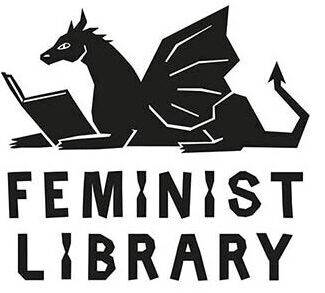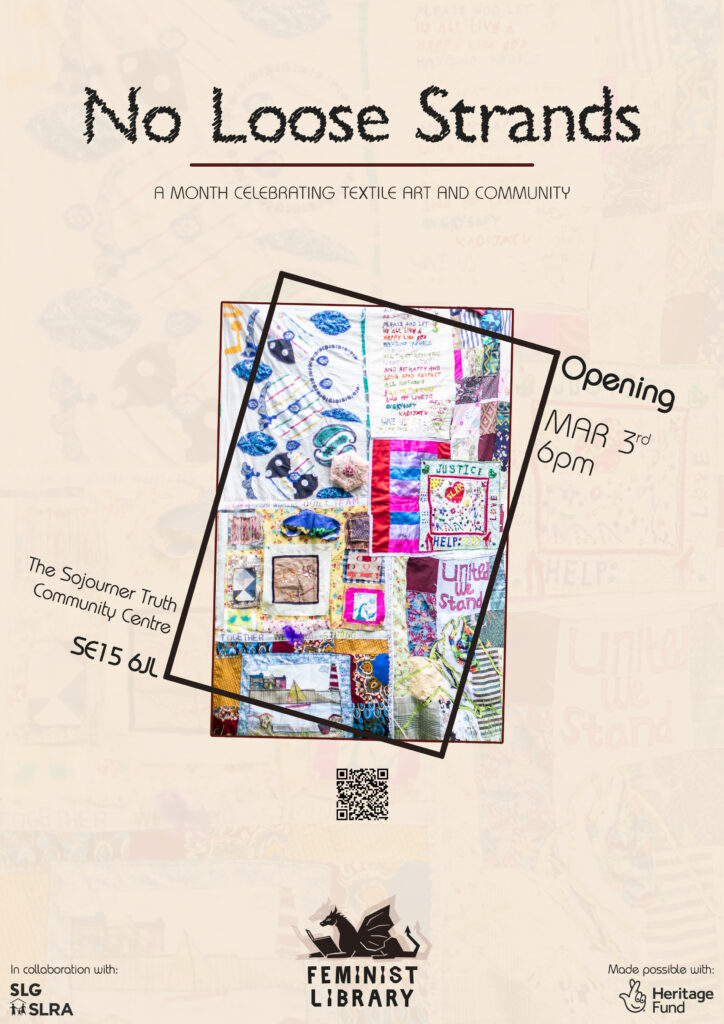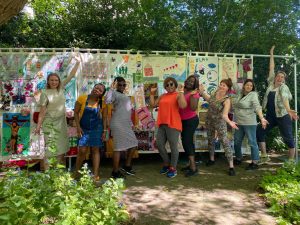Feminist Library WHM – NO Loose Strands
We Are A Group Of Excellent Women is an exhibition and programme of public events. A large scale patchwork quilt by SLRA’s Womens Group is on display, accompanied by a zine featuring interviews, photographs and poetry. Between April 2020 and July 2021 the group met weekly online to support and care for each other, be creative and organise for change. The exhibition also includes original zines, periodicals and posters from The Feminist Library collection that focus on women’s migration.
6th March, 1pm – 4.30pm – Banner-Making @The Feminist Library with Halina Edwards
9th March, 7pm – Arpilleras Online Workshop @ Zoom with Daniela Pizarro Torres
12th March, 1pm – 4.30pm – Banner-Making @ South London Gallery with Halina Edwards
13th March, 1pm – 4.30pm – Embroidery of Bookshelves’ Canvases @The Feminist Library with Halina Edwards
15th March, 7pm – 9pm – Talk on Women in Museums and Archives @Zoom with the Spanish Bookclub.
2nd April, 4pm – The Shoplifter’s Clothes @The Feminist Library with Silvia Bomdardini
As part of our programme, we have collaborated with textile artist Halina Edwards, who will be running a series of workshops across South London Gallery and the Feminist Library, teaching banner making and embroidery. As part of Halina’s work she will be leading a workshop inviting the public to embroider the Library’s canvas bookshelf covers, to remain in the Library as a permanent piece of community art. Members of the Feminist Library collective will be holding embroidery workshops/stitch-a-longs throughout the month, when they will be embroidering on those same bookshelf covers and teaching members of the public textile techniques.
Daniella Pizarro Torres will hold an online workshop on creating Chilean arpilleras, as testimonies of living memory (participants will need to have a needle, threads and pieces of fabric in order to participate).
The Feminist Library’s Spanish Book Club will hold a puppet-making workshop, which will take place on the 19th of March in the Library.
Silvia Bombardini will hold a participatory talk on women’s clothes as sartorial technologies and how these were complicit in acts of shoplifting in the early 20th century.
Artists who will be exhibited
Christina Mitrentse
Hannah Hill
Harriet Hill
Holly Cooper
Johanna de Verdier
Katerina Mimikou
Katrine Skovsgaard
Natasha Eves
Rachael House
Raisa Kabir
Rita Keegan
SLRA Women’s Group
Vittorio/a Camila Vilela Cogorno
About the Project
No Loose Strands is part of the Feminist Library’s ‘Preserving and Promoting Herstories’ project, funded by The National Lottery Heritage Fund. The Feminist Library will exhibit works by invited artists and also create pieces of textile art during community workshops throughout the month. The exhibition will feature quilts, banners and embroidered pieces as well as books, zines and journals from the Library’s collection, alongside new works created during workshops to be hung permanently as part of the fabric of the Library.
While simultaneously a historically ‘feminine medium’ and a means of transgression, textile art now provides a radical insight into knowledge production and communities. Works with textiles were previously relegated to the realm of ‘craft’ rather than ‘art’, and therefore divided across predictably gendered lines. However, reclamations of traditional handcrafts as both legitimate art and political tools are now widespread.
Textile art is often collaborative, whether produced in knitting, weaving and sewing groups where people socialise, create support networks and share skills, or passed on from one generation of a family to the next. Textile arts have also been a prominent and iconic aesthetic in radical organising globally and in the UK. During Pinochet’s regime in Chile, narrative quilt squares called ‘arpilleras’ were sewn to both illustrate and protest the injustice of the dictatorship. In the UK, textiles have featured from the early 20th century Suffragette banners through to the 1970s the Women’s Liberation Movement and the Lesbians and Gays Support the Miners campaign of the 1980s. Banners are still prominent in contemporary direct action and protest groups: Sisters Uncut held banner making sessions ahead of their action in support of the women detained at Yarl’s Wood in 2018.
Community projects to create textile art often explore identity, generational knowledge and the meaning of shared labor and nurturing creativity. The Keiskamma Altarpiece, a monumental piece of embroidery and beadwork, was made by 130 women in South Africa’s Eastern Cape in the early 2000s to commemorate lives lost and altered by AIDS and express the community’s resilience; in 2005 The Knitting Map was worked on by over 2,000 women in Cork, most of them older and working class, to commemorate the city’s status as a European Capital of Culture; during protests following the murder of Mike Brown in St. Louis, Missouri in 2017, black women formed The Yarn Mission to share space away from the streets, knit together and organise for Black Liberation.
A key inspiration for the exhibition, the Feminist Library has invited the South London Refugee Association to showcase a quilt that their women’s group created during the recent Covid-19 lockdowns. Between April 2020 and July 2021 the group met weekly online to support and care for each other and organise for change within the UK’s hostile immigration system. The display is accompanied by a zine created by the SLRA that explores their experiences as migrants and refugees, including discussion of the impact of being designated people with ‘No Recourse to Public Funds’ in Lambeth. This part of the exhibition will be shown at the South London Gallery from the 4th to the 25th of March and will then travel to the Feminist Library, where it will be displayed until the end of May.



